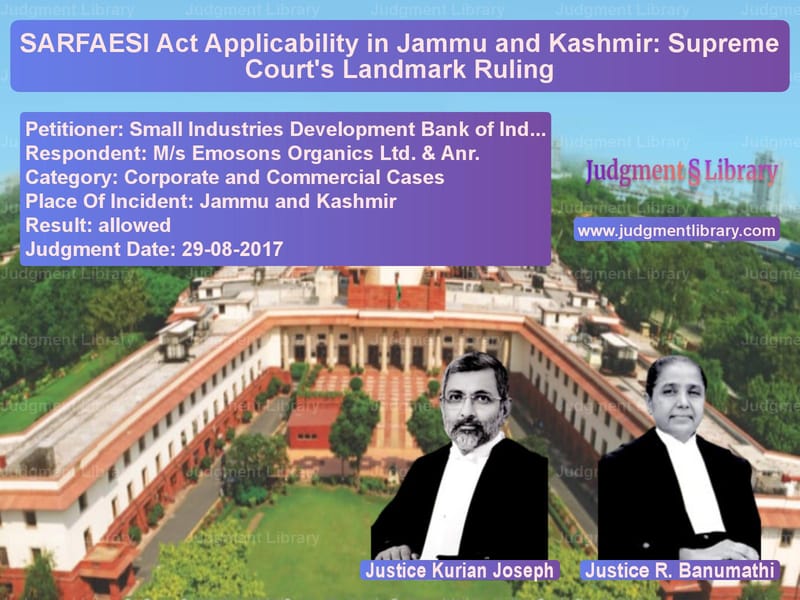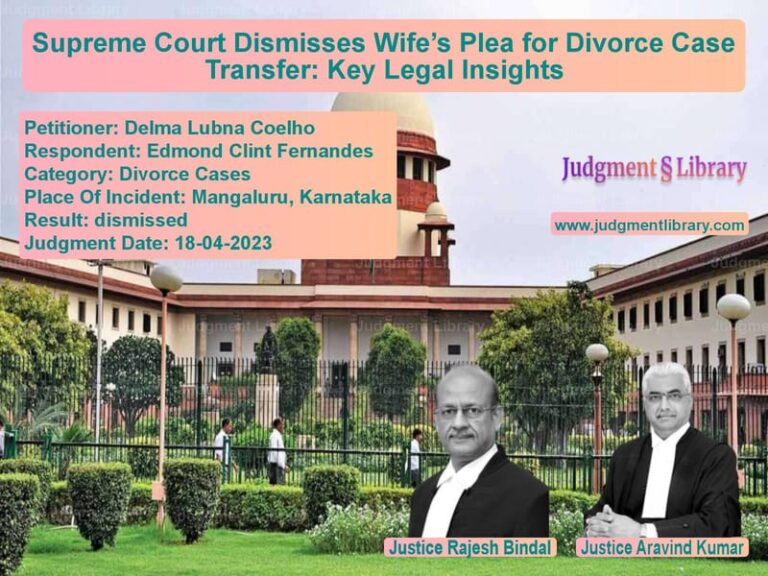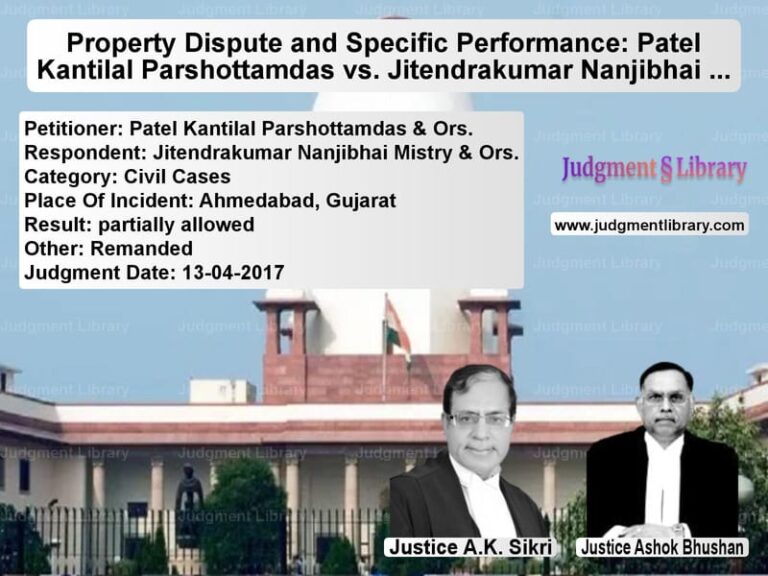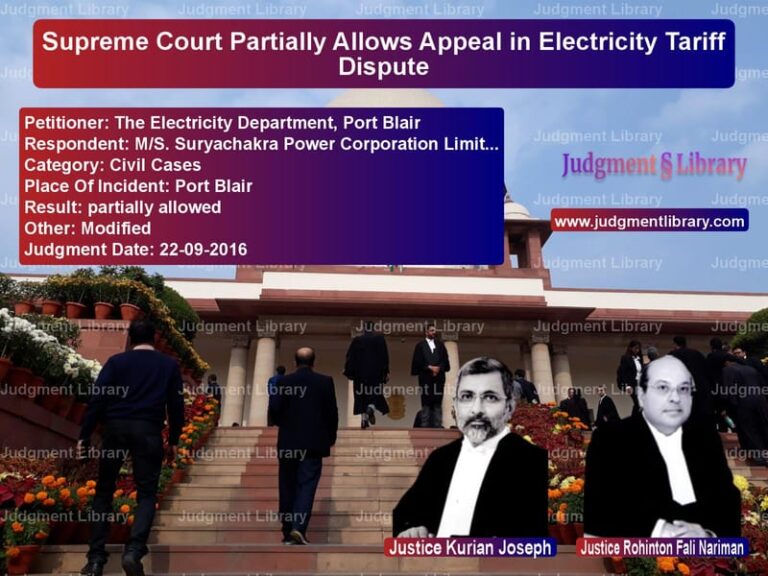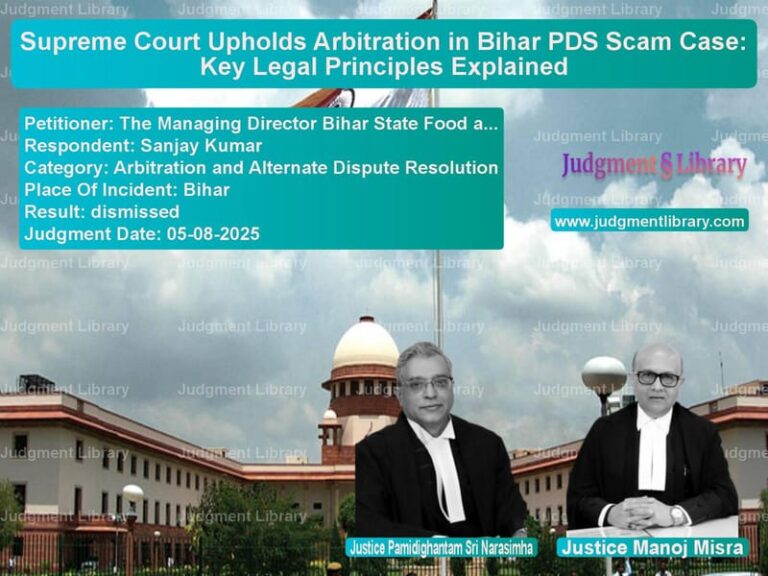SARFAESI Act Applicability in Jammu and Kashmir: Supreme Court’s Landmark Ruling
The Supreme Court of India, in the case of Small Industries Development Bank of India (SIDBI) & Anr. vs. M/s Emosons Organics Ltd. & Anr., delivered a significant judgment clarifying the applicability of the Securitisation and Reconstruction of Financial Assets and Enforcement of Security Interest (SARFAESI) Act, 2002, in the State of Jammu and Kashmir. The case revolved around whether the provisions of the SARFAESI Act extend to financial institutions operating in Jammu and Kashmir, considering the special status granted to the state under Article 370 of the Indian Constitution.
The Supreme Court’s ruling, which relied on its earlier judgment in State Bank of India vs. Santosh Gupta (2017) 2 SCC 538, held that the SARFAESI Act is indeed applicable in Jammu and Kashmir, setting aside the decision of the High Court of Jammu & Kashmir that had ruled otherwise.
Background of the Case
The dispute originated when the Small Industries Development Bank of India (SIDBI) initiated proceedings under the SARFAESI Act to recover debts from M/s Emosons Organics Ltd., a company based in Jammu and Kashmir. The respondents challenged the proceedings before the Jammu & Kashmir High Court, arguing that the SARFAESI Act was not applicable in the state due to its special status under Article 370 of the Constitution.
The Jammu and Kashmir High Court ruled in favor of the respondent, stating that the SARFAESI Act could not be enforced in the state without explicit approval from the Jammu & Kashmir legislature. This ruling was challenged before the Supreme Court by SIDBI.
Arguments by the Petitioner
The petitioners, SIDBI and another financial institution, presented the following arguments:
- The SARFAESI Act is a central law enacted to regulate financial institutions across the country, and it falls within the legislative competence of Parliament.
- The Act was enacted under Entry 45 (Banking) and Entry 95 (Concurrent List) of the Seventh Schedule of the Indian Constitution, which allows Parliament to make laws applicable to the entire country, including Jammu and Kashmir.
- The enforcement of the SARFAESI Act does not require approval from the Jammu & Kashmir legislature because it does not fall under the purview of laws affecting the state’s special status under Article 370.
- The Supreme Court, in State Bank of India vs. Santosh Gupta, had already ruled that the SARFAESI Act applies to Jammu and Kashmir.
Arguments by the Respondent
The respondents, M/s Emosons Organics Ltd., opposed the application of the SARFAESI Act in Jammu and Kashmir on the following grounds:
- Jammu and Kashmir enjoyed a special constitutional status under Article 370, which required specific approval from the state legislature for any central law to be applicable.
- The Recovery of Debts Due to Banks and Financial Institutions Act, 1993, was not applicable in Jammu and Kashmir, and the SARFAESI Act should similarly be considered inapplicable.
- The High Court of Jammu & Kashmir had rightly ruled that state laws governing debt recovery and financial transactions should prevail over central laws.
Supreme Court’s Observations
The Supreme Court bench, comprising Justice Kurian Joseph and Justice R. Banumathi, analyzed the legal framework governing financial regulations and the constitutional provisions related to Jammu and Kashmir. The Court ruled:
“The issue raised in this appeal is whether The Securitisation and Reconstruction of Financial Assets and Enforcement of Security Interest Act (SARFAESI) is applicable in the State of Jammu and Kashmir. That question has been answered by this Court in detail in State Bank of India vs. Santosh Gupta. It has been held by this Court that the Act is applicable in the State of Jammu and Kashmir.”
The Supreme Court clarified that:
- The SARFAESI Act is a legislation related to banking, which falls under the exclusive domain of Parliament.
- Article 370 does not restrict Parliament’s power to legislate on matters related to banking and financial regulations.
- The enforcement of the SARFAESI Act does not infringe upon any fundamental rights or special provisions guaranteed to Jammu and Kashmir.
- The High Court’s ruling was incorrect in interpreting the special status of Jammu and Kashmir as a barrier to the application of the SARFAESI Act.
Legal Principles Affirmed
The Supreme Court’s ruling reaffirmed the following legal principles:
- Central Legislation Supersedes State Laws: The SARFAESI Act, being a law related to banking, is within the exclusive legislative competence of Parliament and prevails over conflicting state laws.
- Article 370 Does Not Restrict Financial Regulations: The special status of Jammu and Kashmir does not exempt the state from national financial and banking regulations.
- Binding Precedent: The ruling in State Bank of India vs. Santosh Gupta sets a precedent that must be followed in all similar cases.
Conclusion
The Supreme Court allowed the appeal and set aside the High Court’s ruling, paving the way for the enforcement of the SARFAESI Act in Jammu and Kashmir. The judgment provided much-needed clarity for financial institutions operating in the region, ensuring that they have the same legal protections and recovery mechanisms available in the rest of the country.
This ruling has significant implications for the banking sector, reaffirming that central financial regulations are uniformly applicable across India, including regions with special constitutional status. The judgment strengthens the legal framework for loan recovery and ensures that banks and financial institutions can exercise their rights under the SARFAESI Act without legal ambiguity.
Don’t miss out on the full details! Download the complete judgment in PDF format below and gain valuable insights instantly!
Download Judgment: Small Industries Dev vs Ms Emosons Organics Supreme Court of India Judgment Dated 29-08-2017.pdf
Direct Downlaod Judgment: Direct downlaod this Judgment
See all petitions in Bankruptcy and Insolvency
See all petitions in Corporate Compliance
See all petitions in Company Law
See all petitions in Judgment by Kurian Joseph
See all petitions in Judgment by R. Banumathi
See all petitions in allowed
See all petitions in supreme court of India judgments August 2017
See all petitions in 2017 judgments
See all posts in Corporate and Commercial Cases Category
See all allowed petitions in Corporate and Commercial Cases Category
See all Dismissed petitions in Corporate and Commercial Cases Category
See all partially allowed petitions in Corporate and Commercial Cases Category

